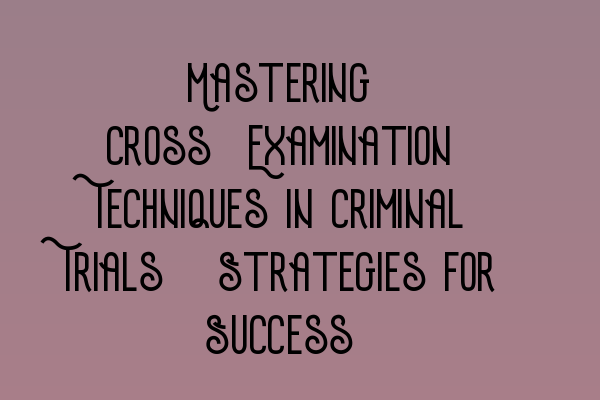Mastering Cross-Examination Techniques in Criminal Trials: Strategies for Success
When it comes to criminal trials, cross-examination is a critical aspect of building a strong defense. It is an opportunity for the defense solicitor to challenge the credibility and accuracy of witness testimonies, ultimately influencing the trial’s outcome.
At SQE Criminal Law & Practice Law UK, we understand the importance of mastering cross-examination techniques for our aspiring criminal defense solicitors. In this article, we will share some effective strategies that can help you excel in cross-examination and increase your chances of success in criminal trials.
1. Preparation is Key
Before entering the courtroom, thorough preparation is essential. Familiarize yourself with all the facts and evidence related to the case. Take the time to review witness statements, police reports, and any other relevant documents. This will allow you to anticipate possible lines of questioning and effectively challenge the prosecution’s case.
Our SQE 1 Preparation Courses can provide you with the necessary knowledge and skills to gather and analyze evidence effectively.
2. Set Clear Objectives
Prior to cross-examination, establish your goals. What do you want to achieve with each witness? Is it to establish inconsistencies in their testimony, undermine their credibility, or highlight alternative explanations for the evidence? Setting clear objectives will help you stay focused and ensure a structured approach during the examination.
3. Control the Witness
Gaining control over the witness is crucial during cross-examination. Use leading questions that allow for simple “yes” or “no” answers. By controlling the pace and direction of questioning, you can limit the witness’s ability to provide explanations or expand upon their responses.
For more tips on controlling witnesses, check out our article on SQE 2 Preparation Courses.
4. Listen Carefully and Intensely
Active listening is an essential skill during cross-examination. Pay close attention to the witness’s responses, body language, and any inconsistencies in their testimony. Maintain eye contact to demonstrate attentiveness and create a sense of connection with the witness.
To enhance your active listening skills, we recommend practicing with our SQE 1 Practice Exam Questions.
5. Impeach the Witness
If you identify contradictions or inconsistencies in the witness’s testimony, you can impeach their credibility by confronting them with prior statements or evidence that contradicts their current claims. By doing so, you undermine their reliability and cast doubt on their version of events.
Our SQE 1 Practice Mocks FLK1 FLK2 can help you simulate real cross-examination scenarios and develop effective impeachment techniques.
Conclusion
Mastering cross-examination techniques is crucial for criminal defense solicitors aiming for success in the courtroom. Through careful preparation, clear objectives, control over the witness, active listening, and effective impeachment strategies, you can significantly strengthen your defense and increase your chances of winning your case.
At SQE Criminal Law & Practice Law UK, we offer comprehensive SRA SQE Exam Dates and preparation courses to equip you with the necessary skills and knowledge to excel in your legal career. Contact us today to learn more about how we can help you achieve your goals.
